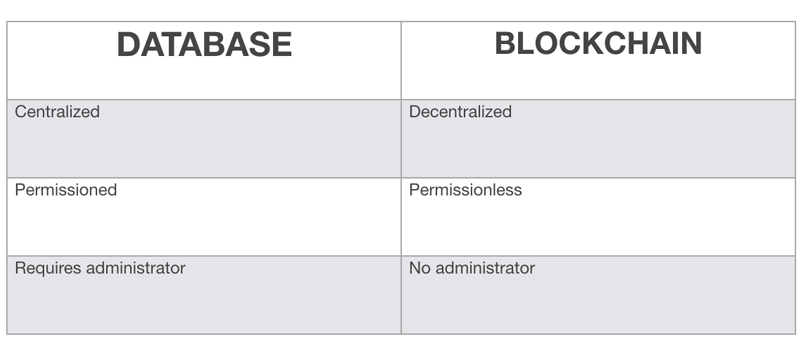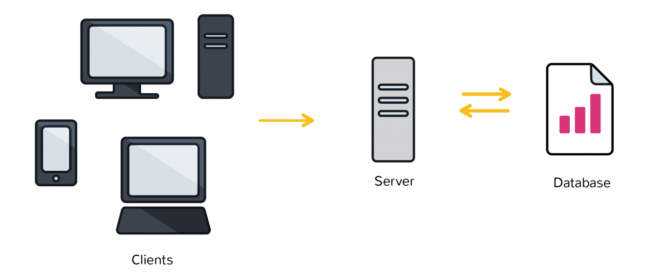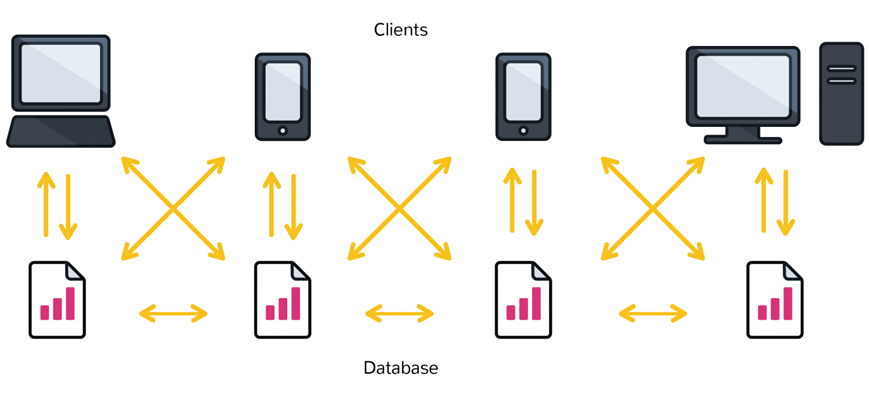The problem with database is that, it needs to be accurate, with all of its transactions matched up. Then there are security issues needed to be addressed, access, reliability and cost.
With cloud computing and storage replacing conventional servers, database hosting has become increasingly cheaper, and yes, also more reliable. But when it comes to disaster recovery and permutability, the cloud may not be capable enough.
As a solution, blockchain can play its role.
The serverless architecture of public blockchains makes the technology powerful enough to have enterprise-grade reliability for business databases. With blockchain technology, costs should not be much higher, but with the advantage of what cloud and servers cannot offer in general.
For example, smart contracts can regulate changes, so people with access can’t just throw anything inside a database to wreak havoc.
Blockchain can protect disasters like this from happening, by preventing any changes that could compromise data or stability.
In short, a blockchain is a server that can’t crash and a database that can’t be corrupted, all packed inside a package that is easy to deploy.
Read: How Blockchain Technology Can Change The Way Modern Businesses Work

A blockchain is actually a database because it is essentially a digital ledger that stores information in data structures called blocks. A database on the other hand, stores information in data structures called tables. However, while a blockchain is a database, a database is not a blockchain.
They are not interchangeable in a sense that though they both store information, they differ in design.
Blockchain may not be originally created for creating database. And it may not be perfectly suited for this job.
But this is like comparing email with instant messaging: People use email to deliver detailed information about something, using attachment and words. But that doesn't mean people can't use email for casual talks on just about any topics imaginable.
Here, using blockchain as a database may not be suitable for big data analytics. But the technology can be useful to create databases about transactional data.
When it is critical to have account data and ownership records, blockchain can mitigate tampering which would otherwise be an existential threat to a company.
By adding always-on availability of blockchain, businesses can ensure continuity.
Businesses often experience the pain of migrating databases and updating systems. Mistakes in the process can lead to massive disaster. Blockchain can create the opportunity for businesses to move quickly while keeping their operations secure.
Blockchain can be the database of choice, because inputs are all backed up and verified continuously. All of the infrastructure and computational needs are calculated before deployment, and embedded rules ensure compliance.
In other words, blockchain can encapsulate processes by tying them together with requests for data.
What makes blockchain a different breed of tech, is that it takes that logic, and wrap it all as a smart contract, to then allowing the owners to run it on their own.
It still adheres to the rules set by the people who created it, and it must interact as expected.
Comparing Database On Servers, And Database On Blockchain

Advantages of using database, include customizability for user friendliness, stability, speed and volume. But database is created to run on centralized systems, and this create some disadvantages.
For example databases have single point of failure. When data is in the hands of single entity or group, there is no way to guarantee that it is being used for the right purpose, as in the case of data from social media winding up in the hands of bad actors.
A company that has control of information can monetize it to third party. This can be a problem when it is not in the best interest of others who are involved in the database creation.
And when a database gets hacked or its servers fail, this can affect the entire system.
If no backup exist, there is no way to recover the lost of valuable data.
Blockchain can negate all these.

Blockchain technology has been adopted by various industries for different purposes. The goal is to create something that cannot be changed, secured and transparent.
With a public blockchain, data is stored cryptographically by the blockchain’s miners all around the world, and on a private blockchain, the owners may run several replicated systems, or even run all the nodes themselves.
Read: The Differences Between 'Permissioned' And 'Permissionless' Blockchain
The main advantages of using blockchain for database, include and not limited to:
- All the information added to a blockchain's blocks is immutable and transparent to all parties involved. Blockchain transactions are non-recursive, meaning they cannot be repeated once validated in a block.
- Robustness, where users don't have to worry about their main server going down.
- Cost efficient as businesses don’t have to pay for any servers. This is because blockchain uses a distributed network of nodes that is decentralized. Decentralization means that all nodes on the network store a copy of the blockchain (database).
- Hashed information using cryptographic security. Blockchain uses SHA256, which is a one way hash function.
- Database on the blockchain is highly fault tolerant, because if one or more nodes are down, there will always be other nodes available that will run the blockchain.
For what is worth, blockchain combines the basic elements of security, robustness, replication, and business logic.
Disadvantages
First of all, maintaining a blockchain requires a bigger energy consumption. To compute resources to run a blockchain requires a huge amounts of electricity. This is part of the protocol required to process transactions in the Proof-of-Work algorithm. All the energy is used by the miners in order to solve cryptographic puzzles to validate blocks.
The second disadvantage, is scalability.
Blockchains do not scale well when it comes to high volume transactions. Because of its fixed block size, database using blockchain can experience problems with increasing transaction volume. Conventional databases can scale to millions of records and process thousands of transactions per second very easily. When using blockchain, this can be an issue.
Then there is the size issue, which can slow down the process, as well as interoperability.
A conventional database Is ideal for:
- Data that need continuous updating, like monitoring and sensors.
- Fast Online transaction processing.
- Confidential information (non-transparent to the public).
- Financial data from markets that require fast processing.
- Data that does not require verification.
- Standalone applications that store data.
- Relational data.
A blockchain-powered database is ideal for:
- Monetary transactions.
- Keeping of transfer of value.
- What is involving trusted data (identity, reputation, credibility, integrity, etc.).
- Public Key Verification.
- Decentralized applications (DApps).
- Voting systems.